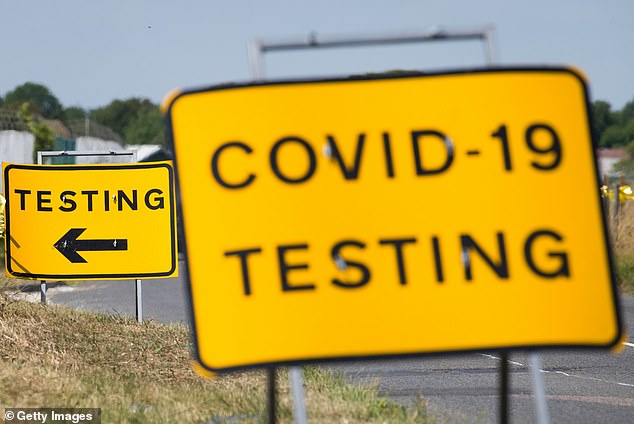Britain’s flying circus: It is farcical that government has taken so long to look into airport Covid testing, says ALEX BRUMMER
Whatever happened to the ‘can-do’ Dunkirk spirit?
The very notion that 200 days after the UK’s Covid lockdown, it is only now that the Government is setting up a taskforce to look at testing in UK airports is farcical.
As anyone who has travelled overseas in recent months will tell you, routine testing is happening at airports across the globe from Istanbul to Wellington.

As anyone who travelled overseas in recent months will tell you routine testing is happening at airports across the globe from Istanbul to Wellington – but not in Britain
The real bugbear, as Virgin Atlantic boss Shai Weiss argued on these pages, is the failure to open a North Atlantic air corridor.
It shouldn’t be beyond the wit of two closely connected Anglo-Saxon democracies with good science, medicine and technology to undo this knot. Failure to do so is not just killing airlines but Heathrow airport too.
EasyJet has no more right to make a profit than any other global carrier. But the disclosure that it now expects to make a whopping loss of up to £845million this year, the first in its 25 years, comes as a jolt.
Founder Stelios Haji-Ioannou blames it on management, which he calls ‘EasyJet scoundrels,’ for squandering shareholders’ money on buying 100 aircraft.
Maybe the timing is unfortunate. But chief executive Johan Lundgren can hardly take the blame for a pandemic and the shameful neglect of the UK’s European leading airline industry by policy makers.
One suspects Lundgren is whistling in the wind when he demands assistance for the industry.
It is hard to have much sympathy for the owners of Heathrow including chief executive John Holland-Kaye, who has had a salary and pension package of £3.7million in 2019 to cushion him through the crisis.
Yet for trade union Unite to ballot workers on industrial action on pay reductions to workers in the middle of a pandemic is bonkers. Wouldn’t the workforce rather be in employment than on universal credit?
The way in which BAA was sold to financial engineers in 2006 and now has a debt pile of £16.7bn in what the union calls ‘bandit capitalism’ is to be deplored.
The lesson to be learned from the pandemic is that, in these most stressful of times, balance sheet resilience is really important.
Ring-fenced
All markets need challengers and telecoms is no different. Toscafund chief Martin Hughes’s tilt at TalkTalk is highly opportunistic, taking advantage of the FTSE discount to other major stock markets.
Taking it private ought to be relatively easy in that he only has to persuade Charles Dunstone to part with his near-30 per cent stake.
Together with hedge fund Toscafund’s 30 per cent stake, Hughes would be home and dry.
He is not known as the Rottweiler for nothing and his 97p bid, worth £1billion or so, seriously undervalues a broadband player.
TalkTalk struggled early in the pandemic and has suffered from languishing near the bottom of Ofcom’s customer service tables.
Revenues have picked up and clearly there is a role for an effective no-frills player in a market dominated by BT.
Its chairman, Dunstone, could retain his stake in a privately controlled TalkTalk.
It is more likely that Toscafund could flush out other bidders – with Vodafone mentioned – in a fast-consolidating telecoms space. Regulators will have a big say.
